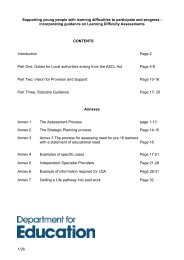What is the research evidence on writing? - Department for Education
What is the research evidence on writing? - Department for Education
What is the research evidence on writing? - Department for Education
Create successful ePaper yourself
Turn your PDF publications into a flip-book with our unique Google optimized e-Paper software.
achievement in <strong>writing</strong> <str<strong>on</strong>g>is</str<strong>on</strong>g> presented in <str<strong>on</strong>g>the</str<strong>on</strong>g> Annex, so <strong>on</strong>ly <str<strong>on</strong>g>the</str<strong>on</strong>g> key points are included<br />
below:<br />
3.1 Pre-school attainment<br />
Children attending Recepti<strong>on</strong> Year have been assessed using <str<strong>on</strong>g>the</str<strong>on</strong>g> Foundati<strong>on</strong> Stage<br />
Profile (FSP) scales 1 until May 2012. From September 2012 a rev<str<strong>on</strong>g>is</str<strong>on</strong>g>ed, simpler versi<strong>on</strong><br />
of FSP came into <strong>for</strong>ce.<br />
Analys<str<strong>on</strong>g>is</str<strong>on</strong>g> of <str<strong>on</strong>g>the</str<strong>on</strong>g> 2012 data shows that <str<strong>on</strong>g>the</str<strong>on</strong>g> majority of children (ranging from 71 per<br />
cent to 92 per cent) c<strong>on</strong>tinued to work securely within <str<strong>on</strong>g>the</str<strong>on</strong>g> Early Learning Goals, in<br />
each of <str<strong>on</strong>g>the</str<strong>on</strong>g> 13 assessment scales (DfE, 2012d). Writing <str<strong>on</strong>g>is</str<strong>on</strong>g> <strong>on</strong>e of <str<strong>on</strong>g>the</str<strong>on</strong>g> topics assessed<br />
in <str<strong>on</strong>g>the</str<strong>on</strong>g> Communicati<strong>on</strong>, Language and Literacy learning area, and in 2012, 71 per cent<br />
of children were working securely within <str<strong>on</strong>g>the</str<strong>on</strong>g> early learning goals. Th<str<strong>on</strong>g>is</str<strong>on</strong>g> means <str<strong>on</strong>g>the</str<strong>on</strong>g>y<br />
had a scale score of 6 points or more, and it was <str<strong>on</strong>g>the</str<strong>on</strong>g> lowest score in compar<str<strong>on</strong>g>is</str<strong>on</strong>g><strong>on</strong> to<br />
o<str<strong>on</strong>g>the</str<strong>on</strong>g>r learning areas. In additi<strong>on</strong>:<br />
- Girls per<strong>for</strong>med better than boys in <str<strong>on</strong>g>the</str<strong>on</strong>g> assessment.<br />
- Writing had <str<strong>on</strong>g>the</str<strong>on</strong>g> lowest proporti<strong>on</strong> of children working securely within <str<strong>on</strong>g>the</str<strong>on</strong>g><br />
early learning goals (71 per cent of children compared to 79 per cent in<br />
reading, 83 per cent in linking sounds and letters and 87 per cent in<br />
communicati<strong>on</strong> and thinking).<br />
- Writing was also <str<strong>on</strong>g>the</str<strong>on</strong>g> assessment scale with <str<strong>on</strong>g>the</str<strong>on</strong>g> highest proporti<strong>on</strong> of children<br />
working towards <str<strong>on</strong>g>the</str<strong>on</strong>g> early learning goals (i.e. achieving a total of 1-3 points).<br />
- There has been a five percentage point increase in <str<strong>on</strong>g>the</str<strong>on</strong>g> Communicati<strong>on</strong>,<br />
Language and Literacy learning area since 2009.<br />
3.2 Key Stage 1<br />
In 2012, 83 per cent of pupils achieved <str<strong>on</strong>g>the</str<strong>on</strong>g> expected level (level 2) or above in<br />
nati<strong>on</strong>al KS1 teacher assessments in <strong>writing</strong> (DfE, 2012a). In additi<strong>on</strong>:<br />
- Pupils per<strong>for</strong>med less well in <strong>writing</strong> in compar<str<strong>on</strong>g>is</str<strong>on</strong>g><strong>on</strong> to <str<strong>on</strong>g>the</str<strong>on</strong>g> o<str<strong>on</strong>g>the</str<strong>on</strong>g>r core<br />
subjects.<br />
- Pupils’ per<strong>for</strong>mance in <strong>writing</strong> has remained more or less stable in <str<strong>on</strong>g>the</str<strong>on</strong>g> last<br />
three years.<br />
- Girls outper<strong>for</strong>m boys by 10 percentage points (88 per cent of girls compared<br />
to 78 per cent of boys).<br />
- Only 70 per cent of children eligible <strong>for</strong> Free School Meals (FSM) achieved <str<strong>on</strong>g>the</str<strong>on</strong>g><br />
expected level compared to 86 per cent of all o<str<strong>on</strong>g>the</str<strong>on</strong>g>r pupils.<br />
1 The Early Years Foundati<strong>on</strong> Stage Profile measured achievements of children aged<br />
five against 13 assessment scales, with 9 points within each scale (‘scale point’). The<br />
13 assessment scales are grouped into six areas of learning: pers<strong>on</strong>al, social and<br />
emoti<strong>on</strong>al development; communicati<strong>on</strong>, language and literacy; problem solving,<br />
reas<strong>on</strong>ing and numeracy; knowledge and understanding of <str<strong>on</strong>g>the</str<strong>on</strong>g> world; physical<br />
development; creative development.<br />
8
















